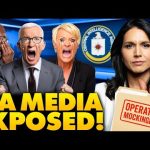In the realm of political discourse, truth often seems like a fragile artifact, carefully preserved in the vaults of history. Recent revelations regarding the classified appendix of John Durham’s final report have stirred the pot once more, challenging the narratives constructed in the wake of the investigations into the 2016 election. A clear thread runs through these discussions: the struggle for truth amid a turbulent political climate. Such moments in history compel a collective introspection on the nature of truth, power, and the moral fabric of our institutions.
At the heart of these discussions lie grave implications about the use of state intelligence for political ends. The Durham report unveils interceptions that suggest not only higher stakes but also a worrisome manipulation of American institutions, supposedly designed to protect democracy. When government entities are wielded as tools in political machinations, the line between truth and manipulation becomes blurred. This scenario calls to mind darker chapters in our history where the very fabric of democratic principles has faced trials, riddled with deception and scandal.
Many may dismiss these revelations as simply partisan banter. However, the historical consequences of such behavior warrant serious examination. Should we accept the idea that intelligence gathering, a method meant for safeguarding national interests, could serve as a weapon against political opponents? The parallels to past abuses throughout American history—instances where the state turned against its own people—underscore the need for vigilance. History is not merely a catalog of events; it is a teacher, reminding us that the mishandling of power can yield devastating consequences.
Moreover, these recent developments shine a light on the media’s role in shaping public perception. The Washington Post and New York Times, among others, frequently assert narratives that align with their editorial stances, sometimes dismissing important facts as mere artifacts of disinformation. This behavior invites a deeper inquiry into the nature of journalistic integrity. When stories are presented selectively, the public’s understanding of reality becomes fragmented. The role of media in constructing and deconstructing these narratives can never be underestimated.
Amidst the noise, one begins to ponder the responsibilities that lie with each individual citizen. The founding fathers crafted a nation built on the principles of democracy, urging participation in the very act of governance. But are today’s citizens merely bystanders? As these layers of deception unfold, the importance of critical thinking and active engagement in political discourse emerges as a necessity. It urges individuals to sift through the rhetoric and seek the truth, for only then can the moral compass of a nation be recalibrated in the face of such turmoil.
As the truth behind these political maneuvers is unveiled, the nation stands at a crossroads. It is a moment ripe with lessons of vigilance, integrity, and moral responsibility. Just as in centuries past, the choices made today will ripple through history, shaping the legacy of our democracy. It remains to be seen whether citizens will rise to the occasion, embracing their role in holding power accountable and ensuring that, as history has proven, the tools of government are not wielded against them. The quest for truth is not merely a political endeavor; it is a moral one, and its significance endures.




